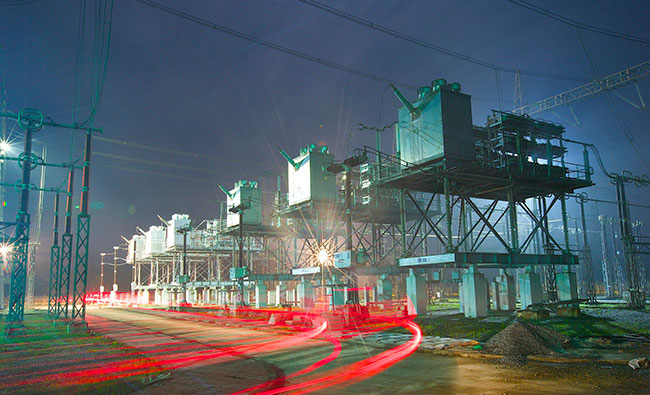General Electric: A highlight of Vietnam – US relations

GE Healthcare provides state-of-the-art medical technology for hospitals in Vietnam
Reliable partner in the development of key economic sectors
Having established its presence in Vietnam in 1993 with its “Company-to-Country” strategy, GE has set a goal of becoming a strategic partner of the Vietnamese government, bringing its strengths to support Vietnam’s development based on the urgent needs of the country. GE has focused on four essential business sectors in Vietnam: power and water, healthcare, aviation, and oil and gas.
In power, GE collaborates with Vietnamese partners and customers in many projects. GE has co-operated with Electricity of Vietnam (EVN) in upgrading the country’s power infrastructure through advanced solutions provided by GE Digital Energy. In May 2015, GE successfully upgraded and energised 14 of the 18 series capacitor banks at the Danang–Ha Tinh, Phu Lam–Pleiku and, Nho Quan–Ha Tinh transmission lines. Playing an important role in developing Vietnam’s potential renewable energy, GE Power & Water joined the first wind farm project in the Mekong Delta province of Bac Lieu, which was invested in by the domestic private firm Cong Ly. GE supplied 10 wind turbines in the first phase of the project and 52 turbines in the second phase, totalling over 99 megawatts of power generation capacity. Following this successful partnership, in October 2014, GE was officially chosen to provide 14 turbines in the first phase of the Tay Nguyen wind farm project located in the Central Highlands’ province of Dak Lak, by HBRE Wind Energy Solution Company. With the installed capacity of more than 2,000MW in Vietnam, today GE equipment supplies approximately 10 per cent of the country’s power.
The partnership between GE and domestic airlines of Vietnam, such as Vietnam Airlines, VietJet Air, and Jetstar is contributing to a safe, convenient, and efficient air travel service. In late 2013, GE signed a contract to supply 40 GEnx engines for the Boeing 787 Dreamliner fleet of Vietnam Airlines, and a contract to supply 40 CFM engines (a product by the GE & Snecma joint venture) for the A320/321 planes belonging to VietJet Air. In 2015, Vietnam Airlines plans to take a bold step forward when it receives the first of its 19 Boeing 787-9 Dreamliner aircraft, powered by GE’s new GEnx jet engine, known as the world’s most fuel efficient engines.
In the healthcare sector, GE Healthcare is providing transformational medical technologies that are defining a new age in patient care. More than half of all clinics and hospitals in Vietnam have at least one unit of GE medical technology, including large central and international hospitals such as 108 Hospital, Friendship Hospital, Viet Duc Hospital, FV Hospital, and Bach Mai Hospital. In November 2014, GE introduced a new suite of innovative solutions for the survival and growth of newborns in primary care or low-resource settings. Most recently, GE Healthcare and Bach Mai Hospital signed a memorandum of understanding (MoU) to introduce a new education and training programme at the Hanoi-based hospital, including the handover of the VND6 billion ($276,000) central patient monitor system.
GE Oil & Gas has had a strong presence in Hanoi and Ho Chi Minh City, focusing on turbo-machinery, drilling and production equipment, as well as support services. To date, GE has supplied technologically-advanced equipment and services for various projects in Vietnam, including the BP gas pipeline project, Dung Quat oil refinery, Ca Mau gas-power-nitrogen complex, and a joint venture with Vietsovpetro. The MoU signed with state-run PetroVietnam in 2010 allows GE Oil & Gas to provide advanced oil and gas equipment, services, and spare parts to optimise the total life-cycle value of key oil and gas projects, which supports oil exploitation and cost efficiency.

GE has pledged to supply engines for Vietnam’s domestic airlines
Boosting investment in production and human resources development
Aside from its business activities, GE Vietnam’s investments have also been a highlight of the last number of years. In 2008, GE invested $60 million in building a wind turbine manufacturing facility in the northern port city of Haiphong, which has been expanded up to $110 million. Employing more than 600 local workers and exporting more than 1,000 generator system units as well as wind turbine components, the GE plant not only contributes to the development of the local economy, it also makes Vietnam an important link in GE’s global production chain. As part of GE’s localisation strategy, the facility has produced an average of 20 per cent of local content at the plant.
GE’s Vietnam Engineering Centre (VEC) was opened in Ho Chi Minh City in late 2012. Emphasising the importance of developing local talent, it set a target of creating up to 200 engineering jobs for the local workforce, which helps advance Vietnam’s influence and position as an engineering powerhouse in the region.
In human resources development, GE has been promoting its “localisation” strategy since it started operations in Vietnam. From a small number of staff at the beginning, GE Vietnam currently employs more than 750 people in Hanoi, Haiphong and Ho Chi Minh City. In fact, the percentage of Vietnamese employees holding key management positions is now almost 100 per cent. At GE, every individual has an equal opportunity to develop technical knowledge, as well as their leadership skills.
Globally, GE invests $1 billion each year in training and education, reflecting its commitment to developing a group of next-generation leaders. In addition, GE offers scholarship programmes, where it trains newly-graduated students to become vital employees that can further the development of the hi-tech sector in Vietnam.
The business, investment, and human development activities of GE in Vietnam have gone a long way towards enhancing the two countries’ bilateral co-operation over the last 20 years. As these ties become closer and more comprehensive, Vietnam will consolidate its position as one of GE’s key markets in the Asia Pacific region.


















![Toni Kroos là ai? [ sự thật về tiểu sử đầy đủ Toni Kroos ]](https://evbn.org/wp-content/uploads/New-Project-6635-1671934592.jpg)


